Saturday, 20 August 2005
Edgar Albert Guest (1881-1959)
Topic: Poetry and Poets
I don't know a great deal about the poet,
Edgar Albert Guest, except that he was born in Birmingham, England, on the 20th August 1881. Some ten years' later, in 1891, his family moved to the United States of America and settled in Michigan, where he lived for the rest of his life. He started work as a reporter for a Detroit newspaper in his early teens and before long started writing daily verses - he became so popular, he was known as the "People's Poet". On 2nd March 1952, Edgar Guest was made Poet Laureate of Michigan, the first and only person ever to receive that title. He died in Detroit, Michigan on 5th August 1959.
Unfortunately, he is not so well known on this side of the Atlantic, which is a great shame. To make amends, I have chosen this poem of his which particularly reflects my mood at present!
Good Books
Good books are friendly things to own.
If you are busy they will wait.
They will not call you on the phone
Or wake you if the hour is late.
They stand together row by row,
Upon the low shelf or the high.
But if you're lonesome this you know:
You have a friend or two nearby.
The fellowship of books is real.
They're never noisy when you're still.
They won't disturb you at your meal.
They'll comfort you when you are ill.
The lonesome hours they'll always share.
When slighted they will not complain.
And though for them you've ceased to care
Your constant friends they'll still remain.
Good books your faults will never see
Or tell about them round the town.
If you would have their company
You merely have to take them down.
They'll help you pass the time away,
They'll counsel give if that you need.
He has true friends for night and day
Who has a few good books to read.
Sunday, 10 July 2005
Fl./Lt. Dennis G. Hornsey, D.F.C.
Topic: Poetry and Poets
The late Dennis Hornsey was a World War II pilot serving with
No. 76 Squadron flying a Handley Page Halifax Bomber. The crew named their aeroplane
Excelsior and had a clenched fist with one finger pointing upwards painted on her side. On the night of 3rd/4th of November 1943, the aeroplane failed to return from an operational flight to bomb Dusseldorf. It had been shot down by a night fighter and crashed at Opgrimbie in Belgium. All seven crew bailed out but six of them were eventually captured and sent to prisoner of war camps. Dennis Hornsey was the only one to successfully evade through Belgium, France, over the Pyrenees and into Spain helped and guided by numerous brave members of the Underground Organisations. He returned to London from Gibraltar on the 11th December 1943.
After the war ended, Dennis Hornsey published his story, and recounted what happened to each of his crew, in a little book called: "The Pilot Walked Home". It is now out of print and very difficult to obtain so I was extremely lucky to find a copy. It is dedicated to the Underground Organisations of Belgium, France and Spain, and those of the R.A.F. who never came back. I was very touched by this poem included at the end of Chapter One of his book. I felt it was appropriate for this special day commemorating the 60th Anniversary of the end of the war.
What Think You, Airman?
by Dennis Hornsey
What think you, airman, when you fly,
So proudly there in heaven's sky?
Do you exult in your great might,
As you go onward through the night?
I think of death beneath my wings,
And of the dire load my bomber brings;
My spirit flinches from the thought
That of this carnage may come naught.
I pray that soon the day will come
When man will offer man his hand,
And peace prevail throughout the land.
I face up to my moment's task
And three things alone of God I ask—
Please help my flesh to stand the strain;
Protect us, Lord, this once again;
And if this cannot be your plan,
Give me the strength to be a man.
Extract from The Pilot Walked Home by Dennis Hornsey. Paperback published by Collins (White Circle) Clear-Type Press: London and Glasgow 1946
I do not know if Dennis Hornsey's widow is still living but if any members of his family read this, I hope they will forgive me for publishing his poem here.
Saturday, 18 June 2005
Tiger, Tiger....
Mood:
 caffeinated
Topic: Poetry and Poets
caffeinated
Topic: Poetry and Poets
I met a llama called Miguel on
BlogPartyWeekend.com, one of
Michael's sites. Just had to get my own pet - isn't she cute! Her name means 'Night'. Listen carefully - she growls sometimes! We both like the poem written by William Blake about the fearsome tiger.
|
|
The Tiger |
TIGER, tiger, burning bright
In the forests of the night,
What immortal hand or eye
Could frame thy fearful symmetry?
In what distant deeps or skies
Burnt the fire of thine eyes?
On what wings dare he aspire?
What the hand dare seize the fire?
And what shoulder and what art
Could twist the sinews of thy heart?
And when thy heart began to beat,
What dread hand and what dread feet?
What the hammer? what the chain?
In what furnace was thy brain?
What the anvil? What dread grasp
Dare its deadly terrors clasp?
When the stars threw down their spears,
And water'd heaven with their tears,
Did He smile His work to see?
Did He who made the lamb make thee?
Tiger, tiger, burning bright
In the forests of the night,
What immortal hand or eye
Dare frame thy fearful symmetry?
|
William Blake (1757-1827) |
|
Updated: 18 June 2005 14:33 BST
Tuesday, 17 May 2005
Humph! Said the Camel
Topic: Poetry and Poets
In his
Just So Stories, originally written for his daughter and published in 1902,
Rudyard Kipling describes 'How the Camel Got His Hump'. The story goes that, when the world was new, there was a Camel who did not want to work for Man and who was
most 'scruciating idle; and when anybody spoke to him he said 'Humph!' Just 'Humph!' and no more. The Horse, the Dog and the Ox got very angry and so, when the
Djinn in charge of All Deserts stopped by to chat, they told him all about the Camel's laziness.
The Djinn went to see the Camel, who said, 'Humph!' He asked the Camel to work. 'Humph!' And then, the Camel's back puffed up
into a great big lolloping humph. The Djinn told the Camel that, as he had missed three days of work, he would now be able to work for three days without eating because he could live off his humph.
And from that day to this, the Camel always wears a humph, (which we now call a hump). But he never caught up with the three days he missed and he never learned how to behave.
THE Camel's hump is an ugly lump
Which well you may see at the Zoo;
But uglier yet is the hump we get
From having too little to do.
Kiddies and grown-ups too-oo-oo,
If we haven't enough to do-oo-oo,
We get the hump --
Cameelious hump --
The hump that is black and blue!
We climb out of bed with a frouzly head,
And a snarly-yarly voice.
We shiver and scowl and we grunt and we growl
At our bath and our boots and our toys;
And there ought to be a corner for me
(And I know' there is one for you)
When we get the hump --
Cameelious hump --
The hump that is black and blue!
The cure for this ill is not to sit still,
Or frowst with a book by the fire;
But to take a large hoe and a shovel also,
And dig till you gently perspire;
And then you will find that the sun and the wind,
And the Djinn of the Garden too,
Have lifted the hump --
The horrible hump --
The hump that is black and blue!
I get it as well as you-oo-oo-
If I haven't enough to do-oo-oo!
We all get hump --
Cameelious hump --
Kiddies and grown-ups too!
Monday, 25 April 2005
Tom Skeyhill (1895-1933)
Topic: Poetry and Poets
Today, Anzac Day, is the 90th Anniversary of the
Australian and
New
Zealand
Army
Corps' landing at Gallipoli on 25th April 1915, as part of a British Empire and French force trying to capture the Dardanelles Strait from Turkey. About 44,000 allied troops, including 11,000 Anzacs, and 86,000 Turks died during the campaign. To mark the occasion, I have chosen a poem called, "
The Naked Army", by Tom Skeyhill, a regimental signaller in the 8th Battalion, 2nd (Victorian) Infantry Brigade, serving in the Gallipoli Peninsula.
I first became interested in Tom Skeyhill when I discovered that he was the original author of, "
My Little Wet Home In The Trench", a parody of the 1911 song, "
My Little Grey Home in the West", by Hermann Frederic Lohr and D. Eardley-Wilmot. He trained in Egypt from January, 1915, to April, 1915, and landed with his battalion on Anzac Beach on 24th April. The next week he was with his Battalion at Cape Helles, and was blinded on 8th May, when a high explosive shell burst beside him. He also suffered bayonet wounds to his hands.
In 1916, he published a little book called "Soldier-Songs from Anzac". Some of these had been written "in the firing-line" and some in hospital after he was injured. He was invalided home and then, after the end of the war, went to America where an operation partially restored his sight. He toured the States giving readings and lectures - he was described as "a silver-tongued master of eloquence - a matchless orator, whose powers of description are more vivid, and word pictures of battles are more graphic than those of any other speaker on the war." He edited the War Diaries of Sergeant York and published, "Sergeant York and the Great War" and "Sergeant York, Last of the Long Hunters", (later made into a 1941 film starring Gary Cooper). He then appears to have 'disappeared'. I found one reference, an old
request for information, which indicated that he was killed in a plane accident at Hyanis, Massachusetts, in 1933, and that he may be buried in West Dennis.
The Naked Army |
|---|
We ain't no picture postcards,
Nor studies in black and white;
We don't doll up in evening clothes
When we go out to fight.
We've forgotten all our manners,
And our talk is full of slang,
For you ain't got time for grammar
When you 'ear the rifles bang.
The 'eat 'ere an' the vermin
'Ad drove us nearly balmy,
So we peeled off all our clobber,
And we're called "The Naked Army."
We never wear our tunics,
Unless it's cold at night;
An' socks and shirts and putties,
We've chucked 'em out of sight.
We only wear a pair of shorts
That don't near reach our knees,
And we're burnt as brown as berries;
Still, we'd sooner sun than fleas.
The Tommies fighting round us
Think we've got a bally rat;
They're all togged up to a button,
An' us, in shorts and 'at.
The air and sun don't 'urt us
In this land of fleas and strife,
So we've chucked away our clobber
An' prefer the Simple Life.
The Rookie, when first landed,
'Angs on to all 'is clothes,
But when the grey-backs bite 'im,
It's to the beach 'e goes.
Then off comes shirt and tunic,
Boots, socks, and putties, too;
'E dives deep in the briny,
An' wears what the others do.
If our girls could only see us,
Just as we're fightin' 'ere,
I wonder if they'd 'ug us,
Smile, kiss, an' call us Dear!
Sure thing, they still would love us,
Although we're burnt and lean;
They'd think of our 'ome-comin',
An' buy a sewin' machine.
Still, clothes don't make the fighter,
Nor speech don't show the man,
But conduct in the trenches
Proves out the fightin' man.
This aint' no bloomin' picnic,
The earth 'ides 'eaps of slain;
And we'll fight on to avenge 'em,
Or we won't come 'ome again.
We were the first at landin',
And we're 'angin' on until
The Turks get all that's comin',
Then we'll be in at the kill.
When we march through old "Connie,"
Some one will yell, "Lor' blahmy!
There lies the Young Turk's Harem.
Double up! The Naked Army!" |
"Not since the pre-historic stone ages has such a naked army been seen in civilised warfare as the Australian Army Corps fighting on the Gallipoli Peninsula. These suntanned, stalwart, athletic colonials display an utter abhorrence for superfluous clothing. They are famous throughout Europe for their hard-fighting, hard-swearing, and nakedness even to a sense of indecency. In marked contrast is the British regular, who never discards his clothing, no matter under what circumstances they are fighting." |
?Egyptian dailies |
Composed: Al-Hayat, Helouin, Egypt, August 25, 1915.
"SOLDIER-SONGS from ANZAC" by SIGNALLER TOM SKEYHILL, 8th Battalion, A.I.F.
Second Edition Published 1916 by George Robertson & Company Propy. Ltd.
Melbourne, Sydney, Adelaide, Brisbane.
Thursday, 14 April 2005
A Little Bit of Garden
Topic: Poetry and Poets
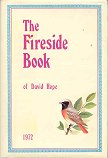
It's funny how you can discover things you didn't know you had! A couple of days ago, I was looking at the jumble of books on a book shelf, a double layer! I spied this little book hiding at the back and pulled it out. It was called
The Fireside Book of David Hope, and it had a lovely little illustration of a bird on the cover - a European Redstart, I think.
No wonder I didn't recognise it. On the flyleaf was an inscription to my parents "... with love from Kitty, Christmas 1971". So, it was a present given to my parents by an old family friend, Kitty Whiting. Her husband, George, used to work at Dormeuil Freres with my father before the war. Kitty was very Welsh and, when my son was born, she insisted that 'David' was a Welsh name - never mind the Hebrew King David or the story of 'David and Goliath' in the Old Testament, all of which predates Welsh history by some 2,000 years or more!
Back to the book - I must have brought it over when we were clearing out the house and then I had put it away without looking. I sat down to read though it. It is full of poems by a variety of poets, with an illustration for each poem. Some of the poets,
John Betjeman;
Walter de la Mare;
Thomas Hardy;
A. Conan Doyle (did you know he wrote poetry? I certainly didn't!);
Alfred Lord Tennyson and
R.L. Stevenson, were familiar names. The other poets, around twenty of them, I had not heard of before. What a super little gem!
A poem entitled "
A Little Bit of Garden" by
Will H. Ogilvie caught my eye, it certainly fits the time of year and my mood. Weather permitting, I will be very busy over the next few days because the Royal Mail delivered two small boxes - my Busy Lizzie plug plants - 300 of them! That will take a while to pot on into trays. Still, it is a very economical way to buy them and, I must admit, I am a lazy gardener. Busy Lizzies (Impatiens) need no maintenance - no deadheading - and give a beautiful show of colour in the garden and in tubs. Last year, mine continued well into November.
Here is the poem:
A Little Bit of Garden
We need no crown or sceptre,
For, now that it is Spring,
Just a little bit of garden?
And every man's a king !
A little breadth of border,
A little patch of grass,
Above it all the April sky
Where soft the south winds pass.
A spade and rake for comrades,
The smell of rain-wet mould?
And every time we turn a clod
We turn a mint of gold !
A little bit of garden,
With daffodils a-swing,
And tulip-flowers whose crimson flags
Are only flown for Spring.
Shy blossoming primroses.
Forget-me-nots of blue,
And here a blade and there a blade
Of green things peeping through.
Who seeks for crown or sceptre
When every man's a king
Whose patch of cottage garden
Has felt the feet of Spring ?
by Will H. Ogilvie(1869-1963)
From "The Fireside Book" - A picture and a poem for every mood chosen by David Hope.
Printed and Published 1971 by D.C. Thomson & Co. Ltd., Dundee and London.
Monday, 4 April 2005
Oliver Goldsmith (1728-1774)
Topic: Poetry and Poets
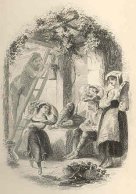
I have a lovely little book on The Poetical and Prose Works of Oliver Goldsmith with Life. Published by Gall and Inglis of 6 George Street, Edinburgh, it has 'Eight Engravings on Steel' and is leather bound with gold decoration. No date but probably circa 1860.
I had been puzzled by the conflict in the published dates for the birth of Oliver Goldmith but this book explains why. According to the flysheet of his father's family bible, "Oliver Goldsmith was born at Pallas, November ye 10th 17__." The last two figures having been lost with the margin of the leaf; but, from other sources, he is known to have been born in
1728. Apparently, even the monument erected to him in Westminster Abbey, bearing a Latin inscription from Dr. Samuel Johnson, got it wrong.
Oliver Goldsmith's works include "The Vicar of Wakefield", "She Stoops to Conquer" and "The Good Natured Man". He wrote many poems and also penned numerous essays. His friends included Dr. Samuel Johnson, Sir Joshua Reynolds and Edmund Burke.
Here is an extract from his poem, "The Traveller", first published at the 'close of 1764'. It established his reputation as a poet.
Eternal blessings crown my earliest friend,
And round his dwelling guardian saints attend!
Blest be that spot, where cheerful guests retire
To pause from toil, and trim their evening fire;
Blest that abode, where want and pain repair,
And every stranger finds a ready chair;
Blest be those feasts with simple plenty crown'd,
Where all the ruddy family around
Laugh at the jests or pranks that never fail,
Or sigh with pity at some mournful tale;
Or press the bashful stranger to his food,
And learn the luxury of doing good.
[extract: second verse]
Oliver Goldsmith died in London from a fever in the 'forty-sixth year of his age' on 4th April 1774.
Monday, 21 March 2005
A Voice Spake Out Of The Skies
Topic: Poetry and Poets
A brief verse for
World Poetry Day and, I suspect, a little known work by one of England's greatest poets,
Alfred Lord Tennyson (1809-1892).
A Voice Spake Out Of The Skies
A Voice spake out of the skies
To a just man and a wise?
'The world and all within it
Will only last a minute!'
And a beggar began to cry
'Food, food or I die'!
Is it worth his while to eat,
Or mine to give him meat,
If the world and all within it
Were nothing the next minute?
from Ballads And Other Poems by Alfred Lord Tennyson Poet Laureate.
London: Macmillan And Co., Limited New York: The Macmillan Company 1906
Food for thought?
Friday, 18 March 2005
Wilfred Owen
Topic: Poetry and Poets
The English poet,
Wilfred Owen, was born 112 years' ago, on the 18th March 1893, in
Oswestry, Shropshire, United Kingdom. He enlisted in the army in 1915 and fought as an officer in the
Battle of the Somme. In May 1917, he was hospitalised for shell shock and during his convalescence, met
Siegfried Sassoon, the poet and novelist. They became firm friends and Sassoon took him under his wing, guiding and influencing him with his writing. It is thanks to Sassoon that Wilfred Owen's war poems were eventually published.
The horrors of war and Wilfred Owen's own sense of outrage at the senseless waste of life permeate through his work. Sadly, his war poems often seem to echo what is happening in today's battle zones and only serve to emphasis the futility of war. Something that human beings, whom I once dubbed '
Homo Hostilis' (a mutated form of 'Homo Sapiens') never seem to learn! Sadly, Owen was killed in action on 4th November 1918 - just seven days before the end of hostilities. This is one of his dark poems, penned in 1917:
ANTHEM FOR DOOMED YOUTH
What passing-bells for these who die as cattle?
Only the monstrous anger of the guns.
Only the stuttering rifles' rapid rattle
Can patter out their hasty orisons.
No mockeries for them; no prayer nor bells,
Nor any voice of mourning save the choirs?
The shrill, demented choirs?of wailing shells;
And bugles calling for them from sad shires.
What candles may be held to speed them all?
Not in the hands of boys, but in their eyes
Shall shine the holy glimmer of good-byes.
The pallor of girls' brows shall be their pall;
Their flowers the tenderness of patient minds,
And each slow dusk a drawing-down of blinds.
|
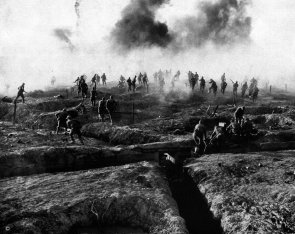 |
Taken from "Selections from Modern Poets" made by J.C. Squire. Published 1934 - London: Martin Secker
Wednesday, 2 February 2005
On Getting Old
Topic: Poetry and Poets
I am sure I have aged at least a month over the past ten days! Far too many late nights sitting at my computer well into the early hours. The trouble is that I have been sitting down at my keyboard around 11:00 or 11:30pm, with a mug of coffee by my side (I know, coffee late at night is
very bad!) and, two or three hours later, I suddenly noticed the time. Then, when I did go to bed, I couldn't get to sleep!
Someone once said that it is a sign of age if you feel like the morning after the night before and you haven't been anywhere. Perhaps, I should go 'somewhere' and see how I feel? My memory's failing - my head's in a spin... Well, this poem says it all! Someone had bought one of those fun laminated cards and had pinned it on the wall in the corridor of my old office many years ago. I liked the poem so much I took it down and photocopied it. It was printed without any verses so that it could all fit on an A4 card but I think it looks better like this. The author is unknown but I suspect it must have been written by a Senior Citizen! Only a revered elder from the elite club of the retired would know how we feel and how to put it all into words! Hope you enjoy it!
I'm Very Well Thank You
There is nothing the matter with me,
I'm as healthy as I can be,
I have arthritis in both my knees,
And when I talk - I talk with a wheeze.
My pulse is weak, and my blood is thin,
But - I'm awfully well for the shape I'm in.
Arch supports I have for my feet,
Or I wouldn't be able to be out on the street,
Sleep is denied me night after night,
But every morning I find I'm alright.
My memory is failing, my head's in a spin,
But - I'm awfully well for the shape I'm in.
The moral is this - as my tale I unfold,
That for you and me who are getting old,
It's better to say 'I'm fine' with a grin,
Than to let folks know the shape we are in.
How do I know that my youth is all spent?
Well, my 'get up and go' has got up and went.
But I really don't mind when I think with a grin,
Of all the grand places my 'got up' has bin.
Old age is golden I've heard it said,
But sometimes I wonder as I get into bed,
With my ears in a drawer, my teeth in a cup,
My specs on a table until I get up.
'Ere sleep overtakes me I say to myself,
Is there anything else I could lay on the shelf?
When I was young my slippers were red,
I could kick my heels right over my head,
When I was older my slippers were blue,
But I still could dance the whole night through.
Now I am old my slippers are black,
I walk to the shop and puff my way back,
I get up each morning and dust off my wits,
And pick up the paper to read the 'obits',
If my name is still missing I know I'm not dead;
And so I have breakfast and - go back to bed.
Author unknown
Newer | Latest | Older
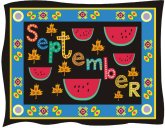

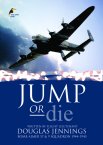
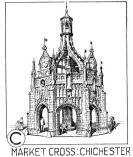

 It's funny how you can discover things you didn't know you had! A couple of days ago, I was looking at the jumble of books on a book shelf, a double layer! I spied this little book hiding at the back and pulled it out. It was called The Fireside Book of David Hope, and it had a lovely little illustration of a bird on the cover - a European Redstart, I think.
It's funny how you can discover things you didn't know you had! A couple of days ago, I was looking at the jumble of books on a book shelf, a double layer! I spied this little book hiding at the back and pulled it out. It was called The Fireside Book of David Hope, and it had a lovely little illustration of a bird on the cover - a European Redstart, I think.  I have a lovely little book on The Poetical and Prose Works of Oliver Goldsmith with Life. Published by Gall and Inglis of 6 George Street, Edinburgh, it has 'Eight Engravings on Steel' and is leather bound with gold decoration. No date but probably circa 1860.
I have a lovely little book on The Poetical and Prose Works of Oliver Goldsmith with Life. Published by Gall and Inglis of 6 George Street, Edinburgh, it has 'Eight Engravings on Steel' and is leather bound with gold decoration. No date but probably circa 1860.